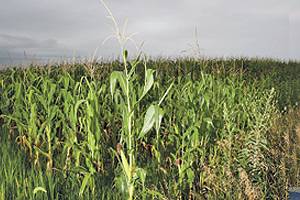Board of Education, governor should rethink approval of school start dates

Corn plants grow in a field on Aug. 12, 2008, near Grimes, Iowa. In its first estimates this year based on actual field visits and farmer surveys, the U.S. Department of Agriculture raised its estimate of corn production and said “nearly ideal” weather has helped Midwestern farmers recover from June’s devastating floods. Photo: Associated Press/Charlie Neibergall
February 13, 2015
The Iowa Board of Education, with the approval of Gov. Terry Branstad, announced in December that it would no longer automatically approve waives by school districts in the state to start before Sept. 1 each year. This, however, was made more complicated by a new proposal from the House Education Committee that would allow schools to start Aug. 23. According to the Des Moines Register, the proposal will be voted on by the committee Feb. 18.
Iowa’s law already states that schools may not start classes before Sept. 1, unless a waiver is granted. In the past, schools have often been granted this waiver to start classes anytime from Aug. 11 to Sept. 1, according to an article in the Des Moines Register. In fact, in 2014, only two of Iowa’s 388 school districts were not granted a waiver to start before Sept. 1.
And while there are some benefits to starting at a later date — extended vacation time in August and opportunities at the Iowa State Fair — those benefits do not outweigh the potential financial and educational risks that come with a later start date.
First, as a state of agriculture, many mid-level education students pick up jobs with companies, such as Monsanto and Pioneer during the summer. The early dates in June are crucial to an efficient start to the summer harvest. Planting crops begins around the same time school dismisses for the summer. With the end of the semester around the final week of May, students can get out and immediately be integrated into their summer jobs.
If the governor’s proposed plan stays in effect as it is, then some high school students may not be getting out until June 15, nearly a week to two weeks later than normal. As many Iowans know how crucial time can be when it comes to farming, the sooner farmers can start, the better. With minimal youth help in the fields, farmers would be at a disadvantage with the later start date.
From an educational standpoint, the school year is divided into two semesters. Beginning the fall semester so late in the year pushes back final exams for many of these school districts. While it may not hinder the elementary to lower middle school levels, high school finals could very well begin after Winter Break. It is at the students’ extreme disadvantage to learn the curriculum for an entire semester, go on break and then come back expected to retain all of the knowledge from the previous semester. To demand or assume students will study and retain the information during Winter Break is otherwise foolish on the part of the governor.
Now that part of the Iowa Legislature has moved to put a bill into effect that would allow schools to start earlier than Aug. 23, it gives educators more time to prepare and examine their curriculum. While it is only about a week more, as mentioned before, a lot can happen within one week’s time. It would be wise for the governor to listen to lawmakers and take a hard look at the disadvantages of creating a later start date.
















